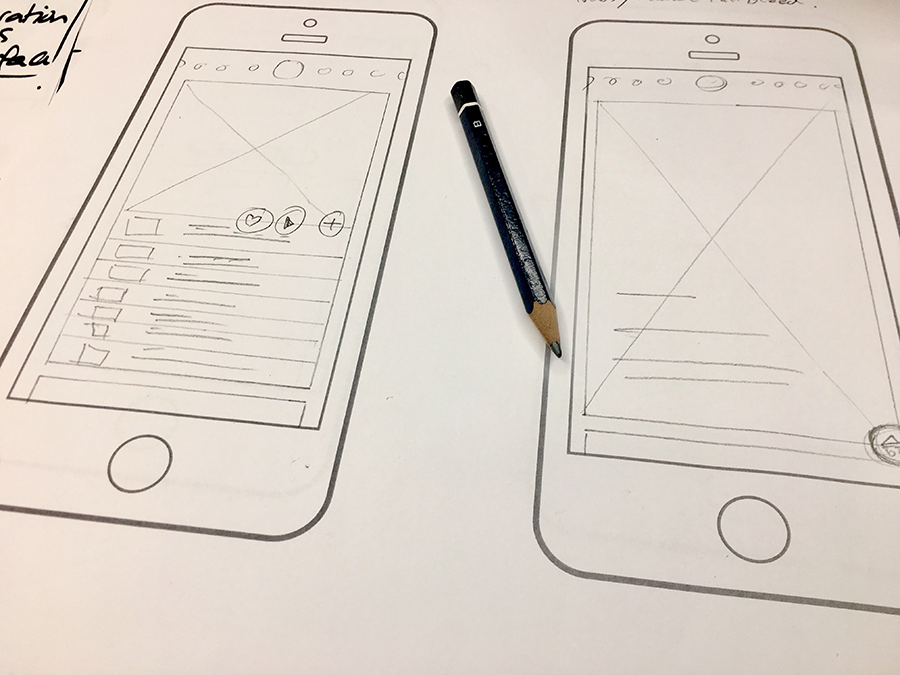
Native vs Cross Platform Apps
Native vs Cross Platform Apps : Which Are Best?
Table of Contents
TLDR
This detailed article explores app development, focusing on native and cross-platform apps.
Native apps are tailored to specific operating systems like iOS or Android, offering optimal performance and integration with device features.
Cross-platform apps, built with frameworks like React Native, run across multiple platforms from a single codebase, offering cost and time efficiency.
The article compares approaches, discussing performance, development cost, user experience, and maintenance. It includes case studies of Spotify (native) and Airbnb (cross-platform) to illustrate each concept.
Future trends like Progressive Web Apps (PWAs) suggest a shift towards web-centric experiences. The choice between native and cross-platform development depends on factors like target audience, budget, and app functionalities.
Introduction to App Development
App development is an extraordinary field at the crossroads of creativity and technical prowess. It’s all about crafting software applications that function seamlessly on various devices, primarily focusing on mobile technology.
The app development journey involves a harmonious blend of design, coding, and user experience expertise. It’s a continuously evolving field, and being part of this dynamic landscape is thrilling.
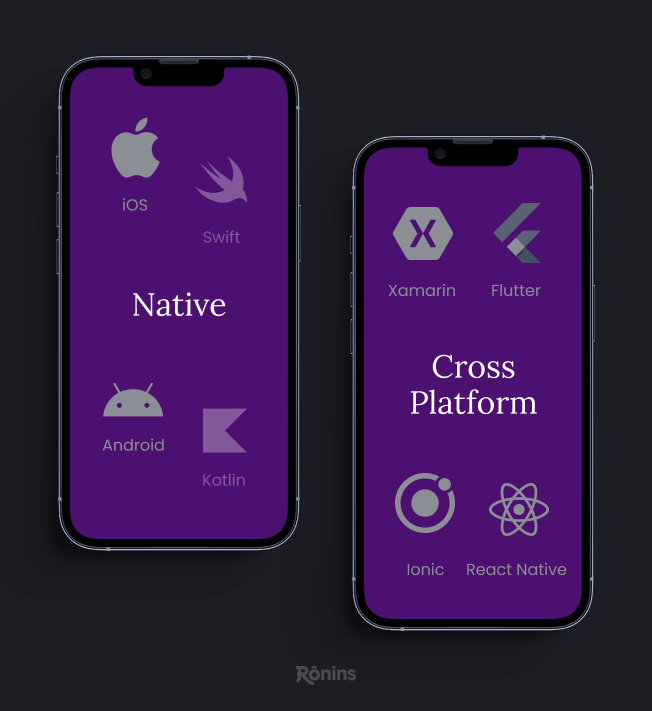
Defining Native Apps
Now, let’s talk about native apps. These applications are specifically designed for individual operating systems, such as iOS or Android. They are developed using platform-specific languages and tools – think Swift or Objective-C for iOS and Java or Kotlin for Android.
The beauty of native apps lies in their ability to leverage the full potential of the device’s hardware and software, offering a user experience that’s fluid, intuitive, and highly responsive. They’re like a tailor-made suit, crafted to fit perfectly with their intended platform.
Understanding Cross-Platform Apps
In contrast, cross-platform apps are akin to versatile wardrobe pieces that fit various occasions. Created using frameworks like React Native or Flutter, these apps are designed to operate across multiple platforms, including both iOS and Android, from one shared codebase. This approach is particularly appealing for its efficiency and cost-effectiveness.
By enabling reach to a broader audience with less repetitive development work, cross-platform apps present an attractive proposition for businesses aiming for wide market penetration.
• • •
Setting the Stage for Comparison
I’ll compare these two app development paths as we dive deeper into this topic, highlighting their strengths and limitations. It’s crucial to understand that the choice between native and cross-platform development can significantly impact the development process and the end-user experience.
Whether you’re a developer or a business owner, knowing the intricacies of each approach will help you make a choice that aligns with your project’s needs, budget, and long-term goals. Let’s embark on this journey of exploration together and discover which path may best suit your app development needs.
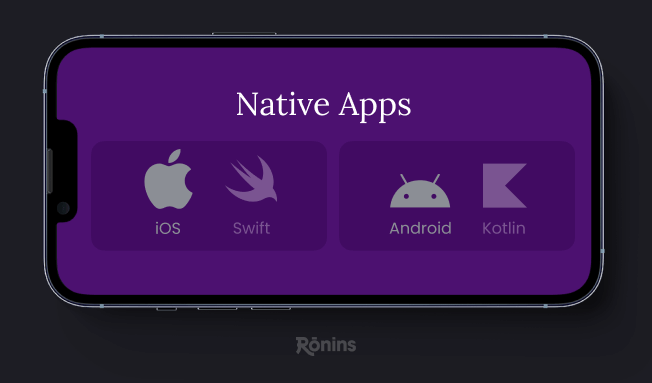
Understanding Native Apps
When we talk about native apps, we refer to software applications developed specifically for a particular mobile operating system. These apps are created using programming languages and tools native to a specific platform – for instance, Swift or Objective-C for iOS and Java or Kotlin for Android. This tailored approach to app development allows native apps to operate seamlessly within their designated ecosystem.
Advantages
The benefits of going native are quite compelling. First and foremost, there’s optimised performance. Native apps can access and utilise the full processing speed of the device they’re running on, resulting in smoother and more efficient performance. This is especially crucial for apps that require intensive processing, like 3D games or complex data applications.
The User Experience
Native apps can integrate deeply with the device’s hardware and OS features, offering a more intuitive and responsive user experience. They can access phone features like the camera, microphone, GPS, and swipe gestures more efficiently, making them feel like an integral part of the device.
Another significant advantage is better integration with device features. Native apps can tap into the specific functionalities of the operating system, like push notifications, which can enhance user engagement.
Disadvantages
However, native app development isn’t without its drawbacks. The most notable is the higher cost. Developing a native app for each platform can almost double your development expenses and efforts. This is because you need to maintain separate codebases for iOS and Android. Also, development time tends to be longer as you create multiple versions of the same app.
Finally, there’s the issue of platform-specific constraints. Each platform has unique guidelines and limitations, which can restrict certain app design or functionality aspects.
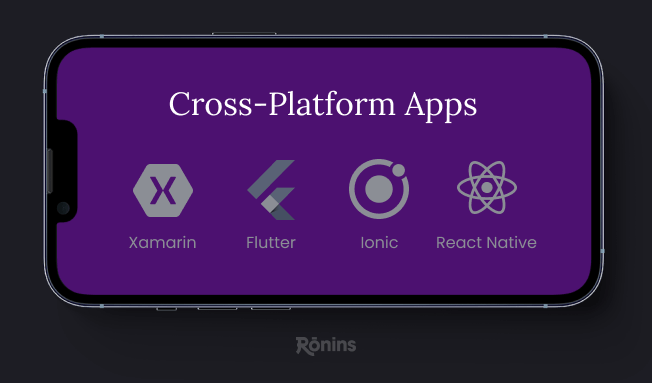
Exploring Cross-Platform Apps
Cross-platform apps are the quintessential solution for reaching a wide audience across various mobile platforms using a single codebase. These apps are developed using frameworks like React Native, Flutter, or Xamarin, which allow the app to run on multiple operating systems, notably iOS and Android, without needing separate development processes for each platform.
A classic example is Instagram, which uses React Native for cross-platform compatibility.
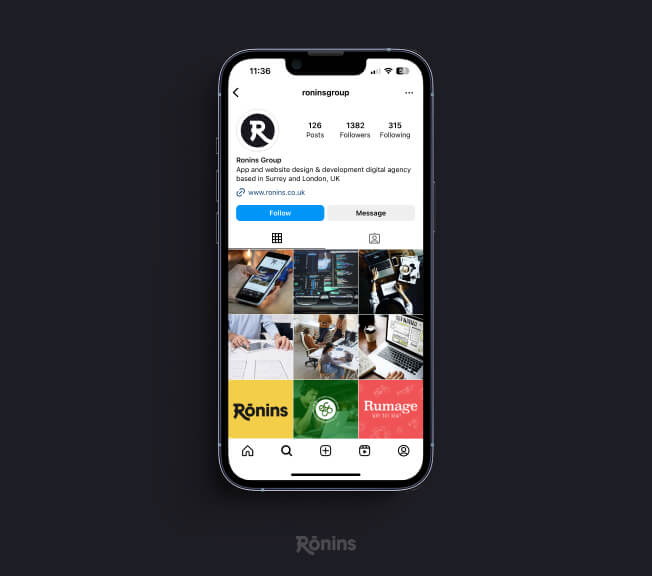
The benefits of cross-platform apps are quite attractive, especially from a business perspective. Cost-effectiveness stands out as a key advantage. Businesses can save significant development costs by deploying a single codebase on multiple platforms. This unified approach simplifies the maintenance and update processes, as changes must be made only once.
Another significant benefit is faster development time. The overall development cycle is shorter since there’s no need to write unique code for each platform. This can be crucial for businesses launching their app in a time-sensitive market.
Cross-platform apps also boast a broader audience reach. With the ability to function on multiple platforms, these apps can cater to a wider user base, increasing the potential for higher user engagement and market penetration.
However, cross-platform development isn’t without its challenges. Performance limitations are one of the main drawbacks. These apps may not always deliver the same level of performance as native apps, particularly in speed and responsiveness.
Additionally, there’s restricted access to device-specific features. While cross-platform frameworks have come a long way in integrating device functionalities, they still can’t match the level of access and efficiency that native development offers.
• • •
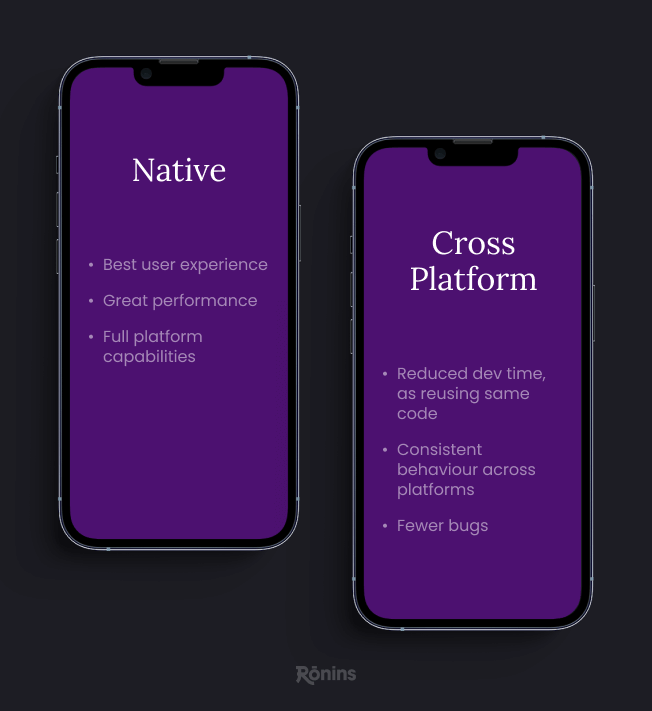
Comparative Analysis
From my perspective, diving into the comparative analysis of native vs. cross-platform apps is like unravelling a complex puzzle. Each has unique strengths and weaknesses, and understanding these can significantly influence your development strategy.
Performance
Let’s start with performance. Native apps, in my experience, have the upper hand. They are built specifically for a platform, which means they can optimally utilise the hardware and software capabilities of the device. This leads to faster response times, smoother animations, and an overall more fluid experience. For example, a native app can handle complex tasks like 3D graphics and heavy data processing more efficiently. While they have made significant strides, cross-platform apps can sometimes fall short in these areas due to the additional abstraction layer they operate through.
Development Time and Cost
Cross-platform apps often appear ahead when we talk about development time and cost. The ability to write once and deploy across multiple platforms is a huge time and resource saver. It’s particularly advantageous for startups or companies with limited resources. Native development, conversely, requires creating and maintaining separate codebases for each platform (iOS, Android), which inevitably leads to higher costs and longer development times.
User Experience
User experience is where native apps shine. They feel more at home on their respective platforms, aligning closely with the operating system’s design standards and user expectations. This familiarity can lead to higher user satisfaction. While increasingly sophisticated, cross-platform apps can sometimes struggle to match this level of integration and fluidity, particularly when it comes to complex gestures or platform-specific design cues.
Maintenance and Updates
In terms of maintenance and updates, cross-platform apps have a distinct advantage. Updating a single codebase is inherently simpler and more cost effective than managing multiple native apps. This can lead to quicker updates and more consistent performance across different platforms. Native apps, while offering a more tailored experience, can be more demanding in terms of maintenance, especially if you have separate teams working on iOS and Android versions.
• • •
Case Studies
In my exploration of app development approaches, I’ve encountered some sterling examples that perfectly illustrate the impact of choosing between native and cross-platform development. Let’s delve into a couple of case studies that highlight these differences.
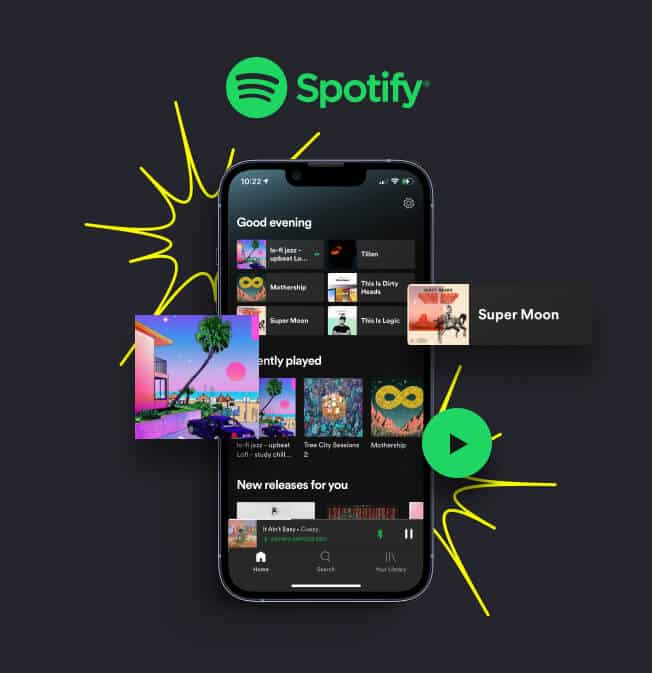
Native App Case Study: Spotify
Spotify, the popular music streaming service, chose native app development for both iOS and Android platforms. The reasoning behind this decision is clear when considering the app’s need for seamless performance, high-quality audio playback, and deep integration with device-specific hardware like audio and Bluetooth controls.
By going native, Spotify ensures that users enjoy a smooth, high-fidelity experience tailored to their device’s capabilities, whether it’s an iPhone or an Android smartphone. This approach has undoubtedly contributed to Spotify’s immense popularity and user engagement.
Cross-Platform App Case Study: Airbnb
Airbnb, the renowned accommodation booking service, initially adopted a cross-platform approach using React Native. This strategic decision was driven by the need for rapid development and deployment across iOS and Android and a desire to manage a single codebase efficiently. The React Native framework allowed Airbnb to maintain a consistent user experience on both platforms while accelerating development time and reducing costs. However, it’s worth noting that Airbnb eventually moved away from React Native for more complex functionalities, which underscores the point that sometimes a hybrid approach, utilising native and cross-platform development, can be the best solution depending on the app’s evolving needs.
These cases illustrate the importance of aligning your development strategy with your app’s requirements and long-term objectives. Spotify’s need for high performance and device integration made native development the optimal choice. In contrast, Airbnb’s priority for speed and efficiency in updates and maintenance made cross-platform appealing, at least in the initial stages of their app’s lifecycle. The key takeaway is that there’s no one-size-fits-all solution; the decision should be based on carefully considering your app’s unique demands and goals.
• • •
Choosing the Right Approach for Your Needs
In my experience, deciding between native and cross-platform development is a critical choice that hinges on several key factors: your target audience, budget, and the specific functionalities of your app. Let me share some insights I’ve gathered over the years, which might help businesses and individual developers make this crucial decision.
Firstly, consider your target audience. Cross-platform development is a smart choice if your audience is spread across various platforms and you aim to reach as many users as possible. This approach lets you simultaneously cater to iOS and Android users, ensuring broader market coverage. However, if your target demographic heavily leans towards a specific platform, or if you’re focusing on a region where one platform dominates, going native might be more beneficial.
Budget is another critical aspect. Native development, while offering superior performance and integration, can be quite expensive since you’re essentially doubling the development effort for iOS and Android. Cross-platform development, on the other hand, is more cost-effective due to the shared codebase. I’ve often seen cross-platform development as a more viable option for startups or businesses with limited budgets.
App functionalities also play a crucial role in this decision. If your app requires extensive access to device-specific features or prioritizes high performance (like sophisticated games or intensive data-processing apps), native development is the way to go. However, for apps that require less intensive use of device capabilities and prioritise wider accessibility, cross-platform development can be equally effective.
A tip for businesses and individual developers: always align your development approach with your long-term strategy. Consider not only the initial launch but also future maintenance and updates. Cross-platform apps can be easier and less costly to maintain and update. In contrast, native apps, though initially more resource-intensive, can offer a more robust and responsive user experience in the long run.
• • •
Future Trends in App Development
One particularly exciting trend in the ever-evolving app development landscape is the rise of Progressive Web Apps (PWAs). These web applications use modern web capabilities to deliver an app-like experience to users.
What’s fascinating about PWAs is their ability to function offline, load quickly, and be incredibly lightweight compared to traditional apps. They represent a blend of web and mobile app experiences, potentially reducing the need for separate native or cross-platform development.
I foresee PWAs gaining more prominence, especially for businesses seeking cost-effective, efficient, and broad-reaching solutions to digital presence. This trend could significantly influence the traditional app development paradigm, shifting focus towards unified, web-centric experiences.
• • •
In Summary
Our exploration of native and cross-platform app development has revealed each approach’s unique characteristics and advantages.
Native apps, tailored specifically for individual operating systems, stand out for their optimised performance and superior user experience, closely integrating with device functionalities. However, this comes at the cost of higher development expenses and longer timelines.
On the other hand, cross-platform apps, with their ability to run across multiple platforms from a single codebase, offer cost-effectiveness and faster development cycles, albeit sometimes at the expense of performance and deep integration with device-specific features.
The examples of Spotify and Airbnb in our case studies highlight these differences in practical terms, showing how the choice of development strategy aligns with an app’s specific needs and goals.
As we look towards the future, emerging trends like Progressive Web Apps (PWAs) are set to blur the lines further between web and mobile experiences, offering a new avenue for developers and businesses.
The decision between native and cross-platform development should be grounded in clearly understanding your project’s unique requirements, target audience, budgetary constraints, and long-term objectives. There’s no one-size-fits-all answer; it’s about finding the right balance that aligns with your project needs and goals.
Whether you choose the tailored excellence of native development or the versatile efficiency of cross-platform solutions, ensure that your approach serves your app’s purpose and enhances the user experience.





